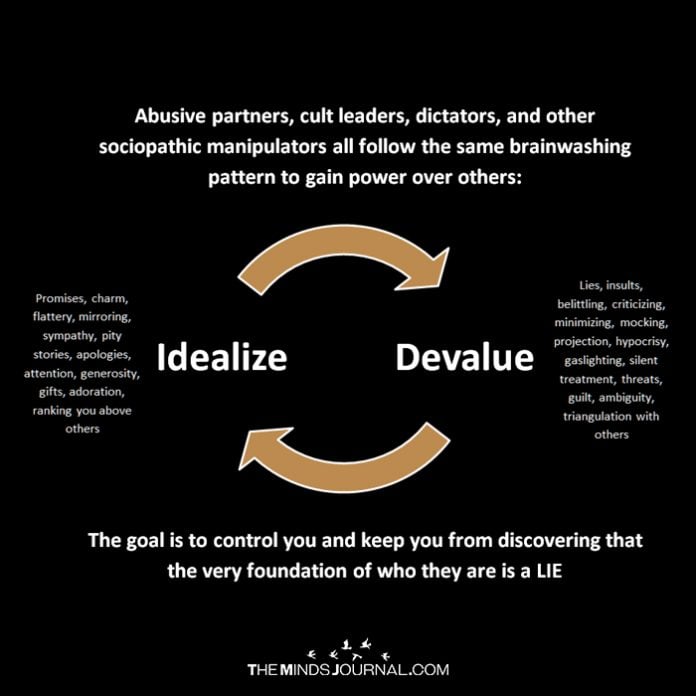The narcissistic devaluation phase is a relationship cycle in which the narcissist begins to devalue their partner rather than getting closer to them. Here’s more on the devaluing narcissist and how their victims are affected.
Devaluation. This period of the narcissistic dynamic is regarded as always being part of the dynamic and understandably the worst part of it.
Those who consider it as an ever present part of the dynamic however are over-stating its presence because whether devaluation appears at all and if it does, how it will manifest, depends very much on the nature of the dynamic with our appliances.
Narcissistic Devaluation Phase: Why Does A Narcissist Discard You?
Commencing with the Tertiary Source, most of the time our engagements with Tertiary Sources do not include any devaluation. There are two main reasons for this :-
- The engagement is brief. We either engage with the Tertiary Source once, for a short time and never again or we engage with them repeatedly but it is only ever brief in nature; and
- The needs of the façade mean that engaging with the Tertiary Source in a benign way is the most effective method of proceeding.
It is the case however that Tertiary Sources are devalued. They will be insulted, ignored, triangulated with other superior-ranking sources.

This devaluation may be because the Tertiary Source has ignited our fury (for instance a bar tender failing to serve us ahead of someone else) but the devaluation may just occur because we regard it as an expedient response.
For instance, we see that it would draw amusement or admiration from our friends (Non Intimate Secondary Sources) if we pour scorn on a homeless person in the street or we insult the waitress in a bar. Neither of these people will have necessarily criticised us but we consider them expendable and by devaluing them we gain negative fuel from them and positive fuel from other sources.
Any devaluation of a Tertiary Source is short in duration. It is a burst of negative fuel but it is not hugely potent (indeed the admiration from the secondary or primary source which it brings about is more potent) when compared to other sources and the quantity of fuel provided is low.
This is because the Tertiary Source will not be bound to us and therefore after a period of time of responding in a manner which provides this negative fuel the Tertiary Source more often than not will dis-engage.
The period of devaluation for a Tertiary Source may be less than a minute if they provide negative fuel and then back off. Of course if they continue to engage us and provide Challenge Fuel, we will keep provoking them and also asserting our perceived superiority over them in order to put them in their place.
We also of course cannot have some upstart Tertiary source making us look bad in front of other superior sources. We are unlikely to keep ‘pursuing’ the Tertiary Source.

Thus, if we upbraid a waiter and he retreats to the kitchen, we are unlikely to follow him and keep the devaluation going. Instead, we take the negative fuel from his angry reaction and let him withdraw.
We consider it largely beneath us to keep pressing such an individual. Of course, if the waiter returns to us, we will devalue again and keep doing so for as long as he keeps appearing in front of us.
It is unlikely that the Tertiary Source will be smeared as a consequence of this devaluation because ultimately within our fuel matrix the Tertiary Source is not of significant importance and therefore it is not worth expending the energy and time on smearing them.
We may see this Tertiary Source on another occasion and provoke them again or we may engage with them in a benign fashion. It does not matter to us how we treated them on the previous interaction because of the way we compartmentalise.

In respect of secondary sources, devaluation does occur but if and when it does, it is for a reason which is directly linked to the behavior of the secondary source.
If someone is a non-intimate secondary source, therefore they are a family member, friend or colleague, they will usually enjoy an elongated golden period. Devaluation of the secondary source will only occur where that individual has sought to expose us, challenge us extensively or has turned off the fuel supply completely.
The devaluation will be longer than that of the Tertiary Source because the secondary source will be bound more closely to us. This binding will be as a consequence of the nature of the relationship – the person is in our social circle with other people, they work with us or they are in our family circle – but also because we will have put more effort into binding them to us.
Accordingly, the secondary source is less likely to withdraw in the same way that a Tertiary Source would. Instead, the secondary source is more likely to want to try to find out why they are being treated this way, to seek to make amends and to gain our favour once again.
Sometimes this devaluation occurs as a consequence of needing to send a signal to other secondary sources that they ought not to cross us so that they realise it is preferable to remain loyal to us than cross us in some way.
The secondary source who is devalued is likely to be smeared by us. We will want other secondary sources of the same circle or ilk to turn against the devalued secondary source and complete their isolation and to ostracise them.

We are conscious of the maintenance of the façade and therefore we will look to present a reason for why this secondary source has fallen from favour, is no longer invited, is not welcome at certain gatherings and so forth.
Related: But Why Did the Narcissist Do That?
The period of devaluation for a secondary source varies in terms of the actual engagement and the period over which the person is regarded as ‘black’. If the secondary source wants to talk to us to find out why they are treated this way, we will keep devaluing them so this might be a matter of minutes or a couple of hours.
If they remain proximate to us and keep providing negative fuel, we will keep devaluing and provoking them. If they retreat and try to engage us on another occasion, they will remain ‘black’ until they do something (or there is an external act) which causes us to regard them as ‘white’ and we welcome them to the fold again.
For instance, if the secondary source seeks forgiveness and has a residual benefit we want, we will extend our graciousness to admit them into the relevant circle again. If we see no purpose, other than negative fuel, then they remain painted ‘black’ and they will be dis-engaged from and we will find a replacement for them soon enough.
In some instances the secondary source may dis-engage and have nothing more to do with us, thus a friend never socialises with us, the family member withdraws or the colleague moves workplaces or department.
Sometimes they may not have such an option and instead they remain in effect a scapegoat for us, remaining ‘black’ for years and are devalued further each time there is any interaction with us. Thus, every time there is a family gathering they will be subject to contemptuous comments, triangulation or silent treatments.

Of course, this long-lasting devaluation may be intermittent as we may only see this secondary source at certain events or places. Similar to the tertiary source we will rarely keep seeking out the secondary source to devalue him or her.
Where the secondary source is of an intimate variety, either an IPSS or DSIPSS, then the dynamic alters. There are two potential forms of devaluation.
The first is used as a corrective measure to bring the IPSS or DSIPSS back into line. Thus devaluation and dis-engagement is not a certainty but instead, if the IPSS or DSIPSS responds favourably to this ‘warning’ then the devaluation will halt and the golden period continues.
This is because the IPSS or DSIPSS’s fuel is regarded as still valuable and not stale and devaluation is used because they are not complying as they ought to do. This corrective devaluation brings them back into line and thus the corrective devaluation halts.
The second is where the IPSS or DSIPSS does not respond to the warning and thus their failure and treachery means that he or she must now be punished as we head towards dis-engagement.
The devaluation in this instance will be more intense than the corrective devaluation but it will not last for long because either the IPSS or DSIPSS stays out of our way or if they do not, we want to turn to a different IPSS or DSIPSS (or find a new one) and therefore dis-engagement comes along quickly.
Related: Does The Narcissist Loves New Supply More?
Finally there is the IPPS. The Intimate Partner Primary Source is the person who suffers the longest devaluation, the harshest devaluation and is the one which is recognized by most people. This happens because
- You promised to be The One. Your failure to live up to our ideals mean you must be punished, we are not going to let you off the hook easily;
- Your negative fuel is potent, plentiful and frequent and therefore we want to keep drawing that from you;
- This negative fuel also provides contrast and the motivation for our seduction of your potential replacement;
- You are bound to us and therefore you are far less likely to withdraw from us. This binding is both emotional and non-emotional. Emotionally it arises because you want to return to the golden period, you want to make everything alright, you are a love devotee and want to have love triumph, you may well be co-dependent, you do not want to admit defeat and you are addicted to us. The non-emotional are matters such as finances, children, house, family pressures and so forth. The combination of these factors means that you cling to us and because you most likely live with us your devaluation occurs each day;
- We grant you Respite Periods. This takes place within the umbrella of the Devaluation Period and means that you are given renewed hope (so you stick around) and also it means your potential for becoming numbed and unresponsive is reduced by these periods which allow you to gather some strength again;
- The IPPS may be the only person in our fuel matrix who is being devalued and this will usually take place behind closed doors to preserve the façade so there is less likelihood of external interference which will disrupt the devaluation.
The devaluation of the IPPS is the most brutal of all the devaluations of appliances, it continues for the longest, it can be years, even decades in some instances and within this devaluation comes a whole host of manipulations and abuses which cover the emotional, the financial, the sexual and the physical.
If you want to learn more about the narcissistic devaluation phase or the signs you’re dating a devaluing narcissist, this video might help:
Written By HG Tudor Originally Appeared On Narcsite Republished with permission
Frequently Asked Questions (FAQs)
How to respond to narcissist discard?
When a narcissist discards you, it signifies that you are no longer useful to them. It might be a challenging moment, so take some time to recover and distance yourself from them.
Why does a narcissist discard you?
When a person can no longer boost the narc’s ego or provide fuel to replace their narcissistic supply, the devaluing narcissist will dump them.











Leave a Reply